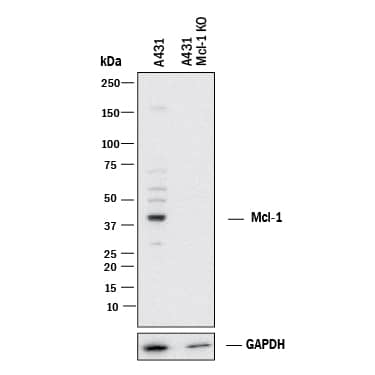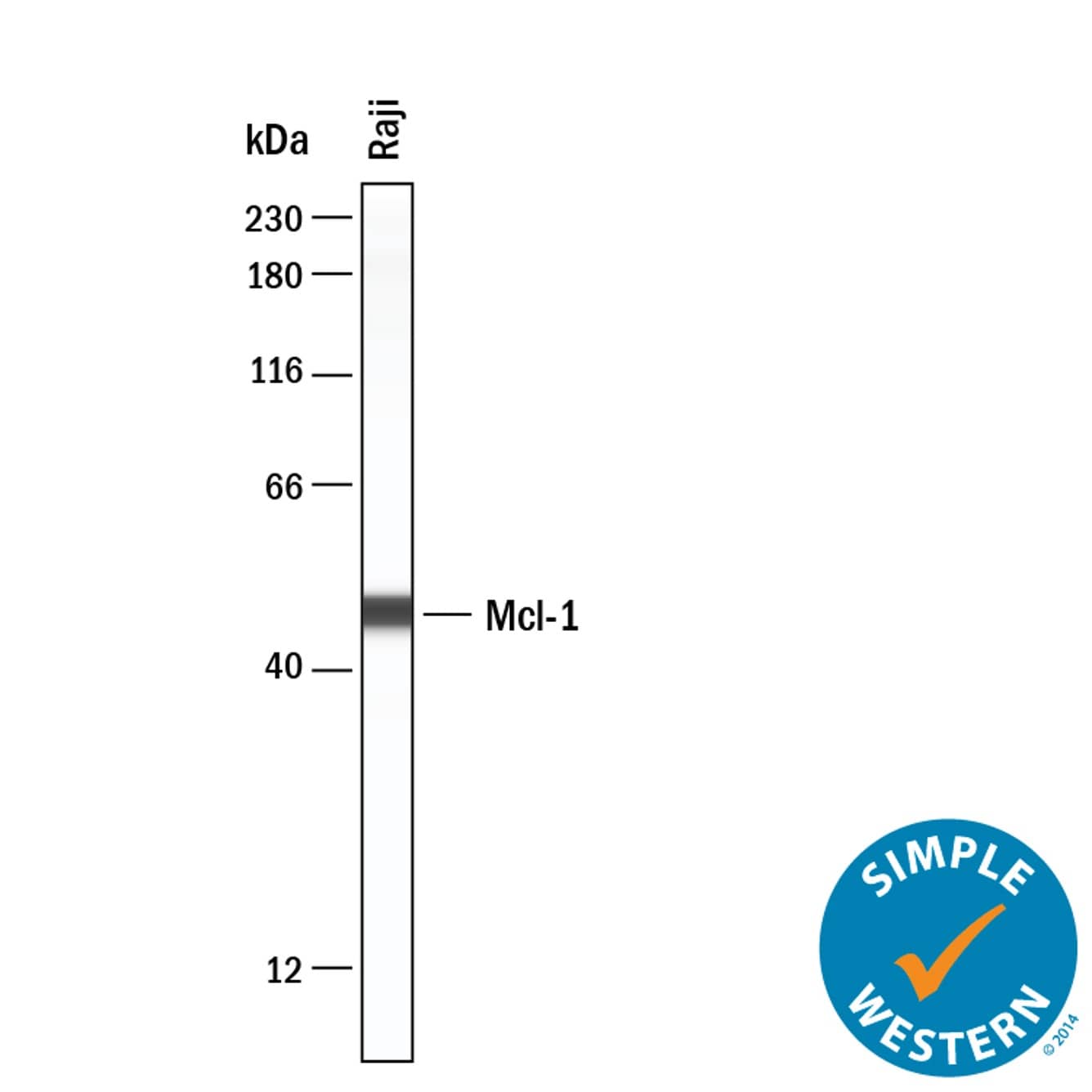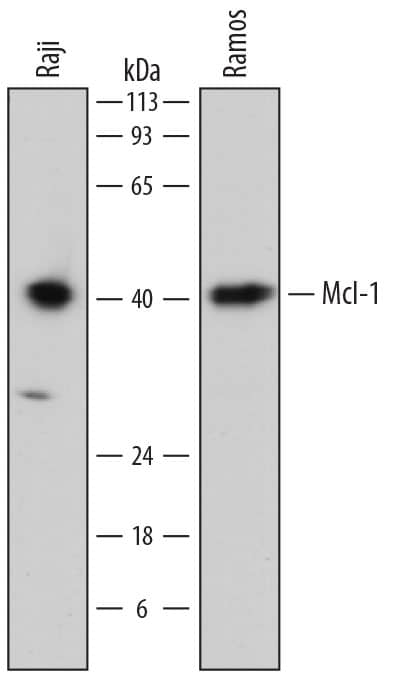Human Mcl-1 Antibody
R&D Systems, part of Bio-Techne | Catalog # AF8281

Key Product Details
Validated by
Species Reactivity
Applications
Label
Antibody Source
Product Specifications
Immunogen
Val147-Gly219
Accession # Q07820
Specificity
Clonality
Host
Isotype
Scientific Data Images for Human Mcl-1 Antibody
Detection of Human Mcl‑1 by Western Blot.
Western blot shows lysates of Raji human Burkitt's lymphoma cell line and Ramos human Burkitt's lymphoma cell line. PVDF membrane was probed with 0.5 µg/mL of Sheep Anti-Human Mcl-1 Antigen Affinity-purified Polyclonal Antibody (Catalog # AF8281) followed by HRP-conjugated Anti-Sheep IgG Secondary Antibody (HAF016). A specific band was detected for Mcl-1 at approximately 40 kDa (as indicated). This experiment was conducted under reducing conditions and using Immunoblot Buffer Group 1.Western Blot Shows Human Mcl‑1 Specificity by Using Knockout Cell Line.
Western blot shows lysates of A431 human epithelial carcinoma parental cell line and Mcl-1 knockout A431 cell line (KO). PVDF membrane was probed with 0.5 µg/mL of Sheep Anti-Human Mcl-1 Antigen Affinity-purified Polyclonal Antibody (Catalog # AF8281) followed by HRP-conjugated Anti-Sheep IgG Secondary Antibody (HAF016). A specific band was detected for Mcl-1 at approximately 40 kDa (as indicated) in the parental A431 cell line, but is not detectable in knockout A431 cell line. GAPDH (AF5718) is shown as a loading control. This experiment was conducted under reducing conditions and using Immunoblot Buffer Group 1.Detection of Human Mcl-1 by Simple WesternTM.
Simple Western lane view shows lysates of Raji human Burkitt's lymphoma cell line, loaded at 0.2 mg/mL. A specific band was detected for Mcl-1 at approximately 48 kDa (as indicated) using 20 µg/mL of Sheep Anti-Human Mcl-1 Antigen Affinity-purified Polyclonal Antibody (Catalog # AF8281) . This experiment was conducted under reducing conditions and using the 12-230 kDa separation system.Applications for Human Mcl-1 Antibody
Knockout Validated
Simple Western
Sample: Raji human Burkitt's lymphoma cell line.
Western Blot
Sample: Raji human Burkitt's lymphoma cell line and Ramos human Burkitt's lymphoma cell line
Formulation, Preparation, and Storage
Purification
Reconstitution
Formulation
Shipping
Stability & Storage
- 12 months from date of receipt, -20 to -70 °C as supplied.
- 1 month, 2 to 8 °C under sterile conditions after reconstitution.
- 6 months, -20 to -70 °C under sterile conditions after reconstitution.
Background: Mcl-1
MCL-1 (induced Myeloid Cell Leukemia differentiation protein 1; also Bcl2L3 and mcl1/EAT) is a 40-45 kDa member of the Bcl-2 family of proteins. It is widely expressed (in B cells, T cells, neutrophils and fibroblasts) and classified as a prosurvival Bcl-2 family member. Functionally, full-length MCL-1 sequesters the proapoptotic proteins Bak and Bax, rendering them inactive. It also delays cell-cycle progression by interacting with CDK1, CHK1 and PCNA. Human MCL-1 is a likely a 350 amino acid (aa) type II transmembrane protein. It contains a large cytoplasmic region (aa 1-327) plus a very short 2 aa C-terminal luminal segment. The cytoplasmic region has multiple domains, including a PEST (Pro/Glu/Ser/Thr)-like segment (aa 104-175), four ubiquitination sites, at least six utilized phosphorylation sites, and three Bcl2-like homology domains (aa 209-223; 252-272; 304-319). MCL-1 is known to form homodimers. There is one splice variant. It is 32-33 kDa in size and contains a 42 aa substitution for aa 230-350. This short form heterodimerizes with full-length MCL-1, rendering it incapable of interacting with Bak and Bax. MCL-1 also undergoes caspase processing. Cleavage after Asp127 generates 17 and 28-30 kDa fragments, while cleavage after Asp 157 generates 21 and 23-25 kDa fragments. These fragments give rise to a proapoptotic environment. Over aa 147-219, human MCL-1 shares 74% aa sequence identity with mouse Mcl-1.
Long Name
Alternate Names
Gene Symbol
UniProt
Additional Mcl-1 Products
Product Documents for Human Mcl-1 Antibody
Product Specific Notices for Human Mcl-1 Antibody
For research use only


